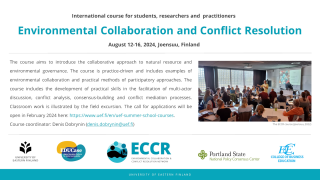Joint University of Helsinki and University of Jyväskylä Africa Day celebration 2024: highlights and reflections
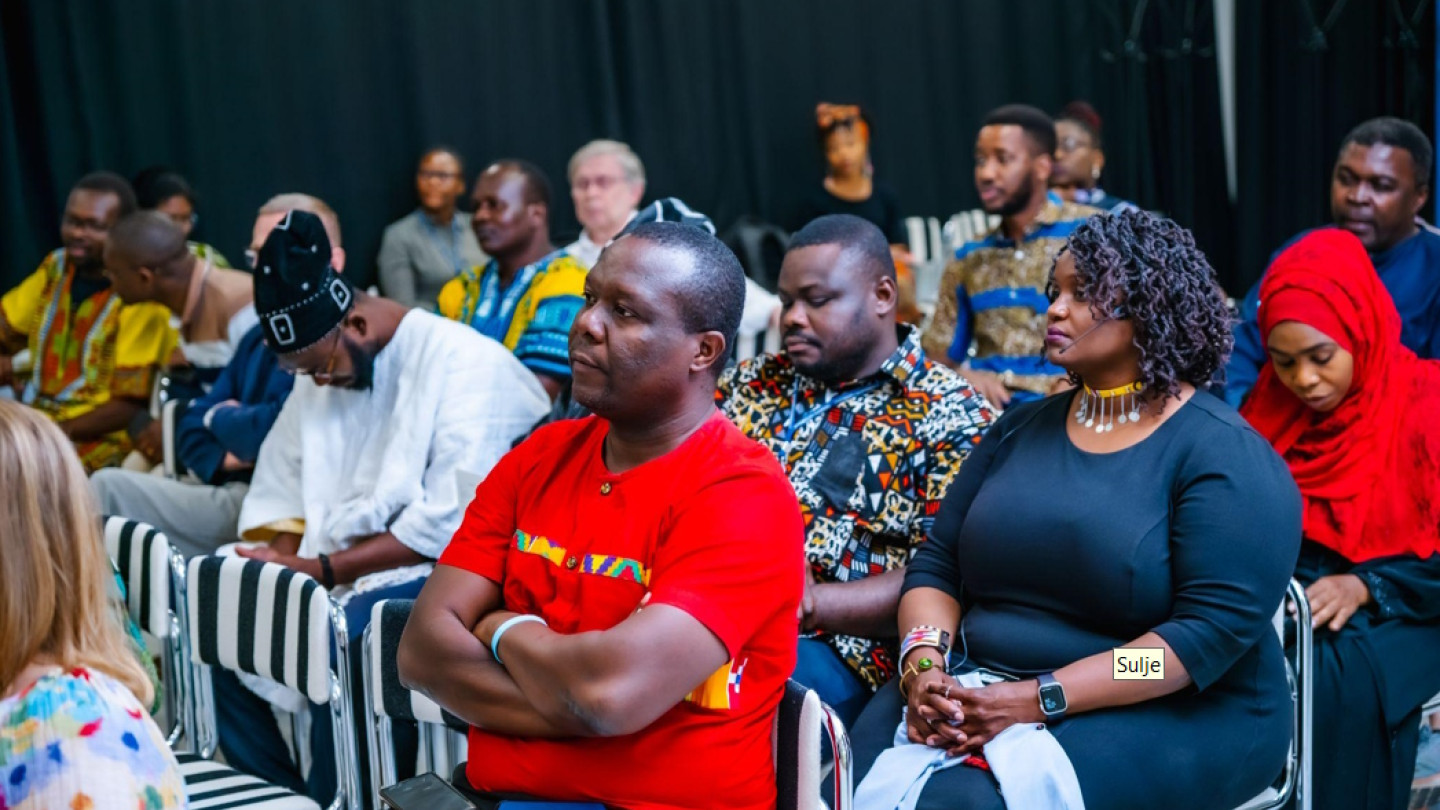
The University of Jyväskylä – Coalition of African Networks and GINTL Africa, University of Helsinki, once again teamed up to co-organise Africa day event in Jyväskylä’s Main Library - Lähde (Finlandia Prize for Architecture 2022 winner) on Friday, May 24th, 2024. The theme of the Africa day event organized in Jyväskylä was Re-thinking African Education systems for the 21st Century. The event focused on how to build resilient education systems for increased access to inclusive, lifelong, quality, and relevant learning in Africa. This year’s Africa Day theme underscores the importance of enhancing access, inclusivity, quality, and relevance in learning. In this blogpost, we present highlights and reflections from the event, with a focus on the keynote speeches and panel discussions as well as on the controversial debate surrounding this year’s Africa Day theme and who the Africa Day is for.
In 2023, the Africa Day event was jointly organized by the University of Eastern Finland, University of Turku, University of Helsinki and the University of Jyväskylä. Collaborations between HEIs is one of the goals of the global network pilots, hence our commitment to foster cross-institutional collaboration.
This year, the event was officially opened by Professor Mika Lähteenmäki, Dean - Faculty of Humanities and Social Sciences, University of Jyväskylä and Adjunct Professor Sai Väyrynen, Director Global Innovation Network for Teaching and Learning at the University of Helsinki. Professor Lähteenmäki in his speech, appreciated the Ministry for Education and Culture for supporting Africa networks through the strategic funding. He acknowledged the successful initiation of new publications with African scholars, consolidation of new collaborations in student and teacher exchange, testified design of collaborative courses with African universities, and noted the emergence of new research proposals. Professor Sai on her part emphasized the significance of collaboration in the area of education with Africa, highlighting that the theme resonated well with the work of GINTL and that meaningful Africa-Finland collaborations have been built as a result of the global pilots.
The Africa day event was hosted at the Open Science centre within the JYU library, as the event was open to all. The event was held in hybrid format and allowed the in-person participation and remote participation of individuals in Finland and Africa. During the event, we reflected on Africa’s approaches to education through the lens of individuals actively engaged with education-related issues in both Africa and Finland with two keynote speakers: Dr. Bridgit Muasa and Dr. Päivi Hasu; and two panel discussions. The panel discussions engaged the plenary by taking their reactions, questions and comments on various issues around the theme of the day.
Highlights from the keynotes and panel discussions
During the event, the speakers reflected on Africa’s approaches to education through the lens of individuals actively engaged with education-related topics in both Africa and Finland and representing diverse organisations. The two keynote speakers, Dr. Muasa, a University of Helsinki visiting researcher from the University of Nairobi, Kenya through the University of Helsinki Early career mobility programme, and Dr. Hasu, who is conducting a study about research on African teacher education for the Finnish National Agency for Education, addressed the theme through the lens of their work and positionality.
In her keynote, Dr. Muasa focused on the role of international exchanges in fostering resilience and breaking barriers among African Early Career Researchers. She emphasized how such programmes, targeting early career scholars from Africa, facilitate access to a wide range of up-to-date research, research infrastructure, and publications. These programmes also support skills development through lifelong learning opportunities and upskilling, and they enhance visibility and networking for collaborations that would otherwise be difficult without such visits and familiarity. These elements are essential for supporting resilient learners to contribute to the continent’s development and prosperity.
However, while the gains of such mobility programmes are enormous, one major challenge is their sustainability, especially since such mobility from Africa to Finland specifically, and to the North generally, is often funded exclusively by the North. This raises the question: is such mobility even a priority for African governments given the numerous challenges education systems in Africa face? Dr. Muasa categorized these challenges into economic (limited state funding, high tuition fees, limited research funding), infrastructure (insufficient and low-functioning facilities, technology, access to scientific material), access and inclusivity (inequalities related to geographic positioning, gender, and disability), and global positioning (low competitive advantage, integration, talent acquisition, and retention). These issues strain resources, making it difficult to invest in mobility programmes that could benefit more African scholars.
Dr. Hasu’s keynote delved into the significance of innovative pedagogies for sustainable lifelong learning in Africa based on existing research on teacher training in Africa around three themes:
Theme 1 – Life-long learning, 21st century skills, and sustainability: Research within this themeshows how African countries are continuously integrating policies for lifelong learning, technologies and project-based learning to foster 21st century skills and while emphasizing adaptable frameworks and strategic practices to address socio-economic and environmental challenges, supported by ICT for sustainable education.
Theme 2 – Indigenous knowledge and sustainability: research on this theme focuses on indigenous knowledge (integrating cultural values, cultural connection and inclusivity into education), decoloniality (embracing African cultural narratives in education, while challenging historical biases for local relevance), and sustainability (integrating indigenous perspectives for environmental stewardship and sustainable community practices in education).
Theme 3 – Technology, innovation, and research-driven educational practices: research on this theme draws attention to the use of digital tools and mobile learning to enhance access in remote areas, the implementation of learner-centred methods and culturally relevant curricular and professional development to empower teachers and foster active learning and the implementation of evidence-based policies, the promotion of collaborative research and the use of data to anticipate educational needs.
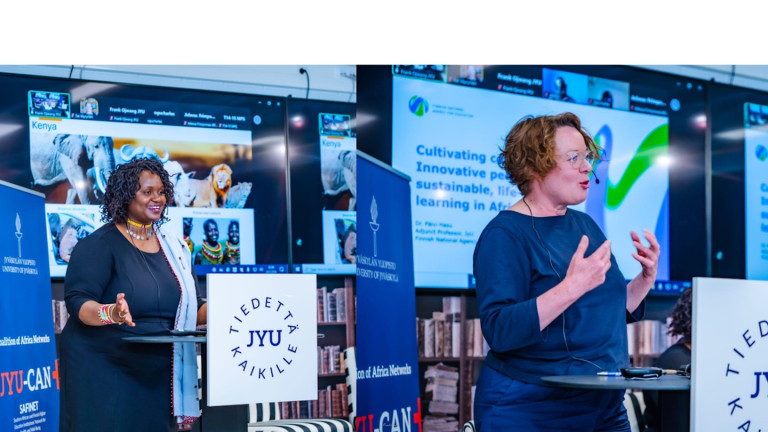
The event had two panel discussions. The first panel engaged researchers and scholars on the dynamics of education systems for the 21st century (a) in Finland and (b) in Africa, focusing on basic education, TVET, HEIs, and alignment with SDG4. As discussed by the panelists Professor Sirpa Eskelä-Haapanen, Irmeli Maunonen-Eskelinen, Dr. Karembe Ahimbisibwe, Dr. Elizabeth Eta, and Dr. Judith Kahamba, there have been notable transformations in the different subsections of education in Africa regarding access, quality, teacher training, infrastructural development, education-labour market transition, and perceptions, especially regarding TVET. Despite these advances, significant challenges persist that need attention, particularly in preparing resilient students for the 21st century.
This panel discussion also touched on how to prepare international African students at Finnish universities to contribute to education development in Africa and Finland, and on cross-contextual learning. While international programs at Finnish universities provide access to Africans, their integration into the Finnish labor market needs improvement. Language policies requiring proof of English proficiency are costly, despite English being the language of instruction in many African countries due to colonial history. For effective Finland-Africa collaboration, we must move beyond one-dimensional transfer processes to promote co-creation, co-learning and sharing, and integration of local knowledges and experts. We must also recognize our limitations and consider the contextual conditions that enable certain policies and models to thrive, while learning not to repeat past mistakes from other systems.
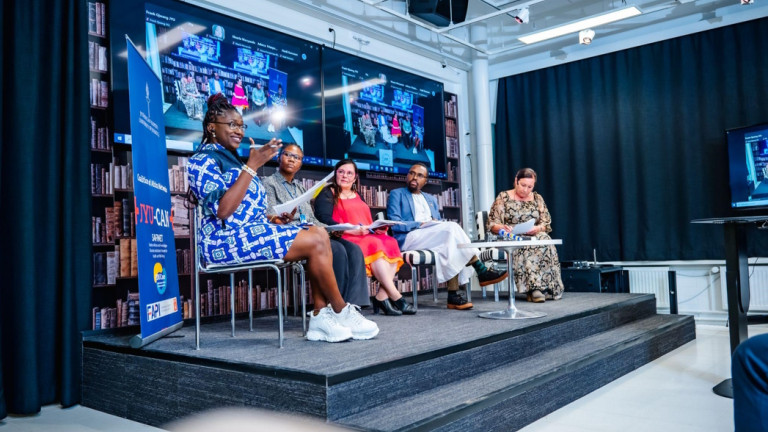
The second panel discussion prompted reflections from the experiences of two NGO practitioners: Dr Pascal Doh of Diana ry and Ms Pauliina Kemppainen of Finn Church Aid, through the various interventions that link learning to earning, and that counter the numerous challenges with innovative solutions that contribute towards building resilient education systems for increased access to inclusive, lifelong, quality, and relevant learning in Africa.
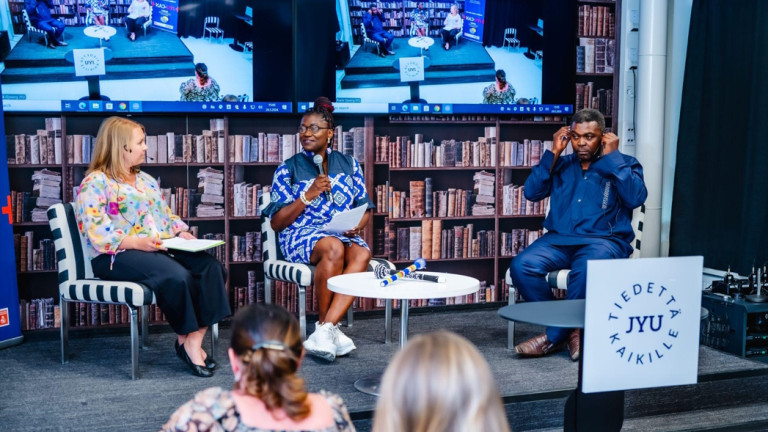
Although the mission and vision of both organisations differ and they have different organisational structure, a major starting point, as both speakers noted, is aligning their projects and interventions in Africa with the African Union agenda, the policies of the specific African country they work in, and the SDGs. They also emphasize working closely with the locals in the different countries to ensure contextual relevance, local ownership, and sustainability of the programmes they run. As the speakers noted, various global crisis, such as COVID-19 that led to school closures, the learning crisis with millions of children in and out of school unable to read, and wars and natural disasters contributing to the refugee crisis prompt them to think innovatively in their attempts to improve access, quality and relevance of education. Despite numerous challenges including funding, perceptions of NGOs involvement in education, competition with other education providers including HEIs, edu-businesses, collaboration with other education stakeholders and institutions contributing to education development in Africa is important for greater impact, cost sharing, information and knowledge sharing and for diverse perspectives to be considered in agenda setting, problem identification, and innovative solution that align with local needs.
The Africa Day theme: a topic of intense debate
The theme of the Africa Day 2024, chosen by the African Union (AU), is Educate an African fit for the 21st Century: Building resilient education systems for increased access to inclusive, lifelong, quality and relevant learning in Africa. The African diaspora in Finland through different platforms that bring them together, engaged in scholarly and political debate about the theme. While the latter part of the Africa Day theme sat well with just about everyone of the African diaspora in Finland, the first part of the Africa Day theme ‘Educate an African fit for the 21st Century’ aroused intense debate, especially with regards to the politics of language. Semantics came to the fore and scholarly lenses were worn to deconstruct the former part of the theme. Words such as disturbing, colonial, disrespectful were used when describing the theme by the African diaspora. The term ‘educate’ triggered initial conversations about the coloniality of the theme and how it positioned the educators perceived to be the west. In addition, the term ‘fit’ prompted heated discussions that felt it represented a colonial attitude and perception about Africans in relation to knowledge, skills and expertise. An African diaspora in one of the forums was taken aback by what he felt was the ‘audacity’ to think, and even write the theme down in its format. “It is so inappropriate and demeaning!” he added.
The organizing committee for the Africa Day event in Jyäskylä city, being from the University of Jyväskylä (JYU) jointly with the University of Helsinki (HY), having forecasted the nature of politics that the theme could draw, reworded the theme to be more palatable for a Finnish HEI hosting an Africa Day event. The theme used by JYU and HY is Re-thinking African Education systems for the 21st Century. There was a clear and unanimous support for the latter part of the Africa Day theme.
Further reflections and discussion showed that the theme was going to dominate the event if not handled well. One African diaspora in a forum said, “Africans are not a problem or should be referred to as an individual that needs fixing. Our education systems are the ones that need updating.” Another person shared that for a very long time, the term: "knowledge transfer" used to mean "Europeans educating Africans" but had been replaced by "knowledge sharing". This reflects efforts to decolonize and break the chains of western knowledge domination and highlighting mutual learning and respect between cultures and the value of indigenous knowledge systems in learning and development.
But in a rare twist of events, another African diaspora felt the theme was okay.
“I do not find it demeaning. The phrase “Educate an African to be fit for the 21st century” calls attention to the type of education - for the 21st century suggests a change in the focus/ forms of education. Education in the 21st century is no longer dominated by western thoughts, knowledge, or history. But in Africa western knowledge still dominates especially in education, both in systems/ content. More so, while education could be taken for granted in the diaspora, statistics by UNESCO shows Sub-Saharan Africa has the highest rates of education exclusion, with 1/5 of 6 and11 years old out of school, 1/3 of 12 and 14 yrs out of school and 60% of youth 15 and 17 yrs not in school.”
After rounds of opinions, it was suggested that a team present the concerns of the African diaspora in Finland to the AU to seek clarification and draw the issues to the attention of the AU. A message was sent but the response had not been provided by the time of the Africa Day event. It will be interesting to see what kind of conversations are had in Africa about the theme. Do they raise the same emotions as it has among Africans in Finland?
Africa Day in Finland: for who and by whom
Every year, a recurring question arises, especially outside Africa, including in Finland: should we celebrate Africa Day, and if so, how? This question seems to be fading as more organizations, including Higher Education Institutions (HEIs) and NGOs, now regularly organize activities to commemorate the day. These activities often include cultural and culinary celebrations as well as educational presentations, discussions, and reflections based on the theme decided by the African Union for the year.
As discussed above, the theme for 2024 is on education. Our activities involved keynote speeches, panel discussions, and poster sessions highlighting and reflecting on approaches to education in Africa and Finland. These sessions featured individuals from diverse organisations actively engaged with education-related topics in both Africa and Finland. However, amidst these celebrations, a critical question around representation arises that requires collective reflection: who should organize and celebrate Africa Day outside of Africa, such as in Finland?
Africa is undeniably a continent of interest to Finland, as evidenced by the Finland-Africa strategy, university-level Africa programmes, and the fact that four out of the eight Ministry of Education and Culture’s funded Global Networks focus on Africa. Funding instruments such the Higher Education Institutional Cooperation Instrument (HEI ICI) and the Higher Education Partnership (HEP) programme support capacity-building projects in the Global South, including Africa. While this article is not intended to generalize, the turnout at the joint GINTL Africa, University of Helsinki, and University of Jyväskylä – Coalition of African Networks Africa Day event suggests that the African Diaspora feels a higher sense of belonging on this day probably because Africa Day provides an opportunity for them to connect with their roots and celebrate their heritage. Notably, this is one day when Africans often take up or are given leadership positions in university-related planning and organization, despite their usual underrepresentation in such leadership roles within university international affairs departments, teaching and research, and capacity-building projects related to Africa. Participation by non-Africans was minimal.
Celebrating Africa's unity, reflecting on its challenges, and recognizing our shared contributions to its development—as well as Africa's influence on global issues—necessitates the involvement of everyone. This encompasses organizations engaged with Africa-related matters and those who value and support Africa's role in global development.
Key takeaways
- Africa Day as a platform for African diaspora advocacy: The Africa Day event is one of the open events that brings together scholars and experts in different themes and fields. Engaging with the scholars and experts can inspire new conversations and directions in research, and this can inspire policy conversations about everyday issues that African migrants face.
- Invitation to collective celebration and reflection: Africa Day is a time for collective celebration and reflection, not only by Africans but by the global community, fostering unity and understanding through cross-cultural dialogue of burning issues.
- Efforts to make our collective work visible: Significant research, projects and collaborative efforts to improve access, quality and relevance in Africa exist. How do we make them visible and promote cross-institutional collaboration for greater impact?
- Align educational projects and programmes with local context’s needs and priorities: We are reminded that local context’s needs should be our starting point in our combined efforts to improve education access, quality and relevance in Africa. Utilising local expertise is key to ensure ownership, sustainability and contextual relevance.




